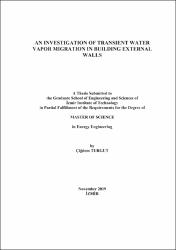Please use this identifier to cite or link to this item:
https://hdl.handle.net/11147/9641Full metadata record
| DC Field | Value | Language |
|---|---|---|
| dc.contributor.advisor | Başaran, Tahsin | - |
| dc.contributor.advisor | Gökçen Akkurt, Gülden | - |
| dc.contributor.author | Turgut, Çiğdem | - |
| dc.date.accessioned | 2020-08-27T13:15:06Z | |
| dc.date.available | 2020-08-27T13:15:06Z | |
| dc.date.issued | 2019-11 | - |
| dc.identifier.citation | Turgut, Ç. (2019). An investigation of transient water vapor migration in building external walls. Unpublished master's thesis, İzmir Institute of Technology, İzmir, Turkey | en_US |
| dc.identifier.uri | https://hdl.handle.net/11147/9641 | - |
| dc.description | Thesis (Master)--Izmir Institute of Technology, Energy Engineering, Izmir, 2019 | en_US |
| dc.description | Includes bibliographical references (leaves: 102-105) | en_US |
| dc.description | Text in English; Abstract: Turkish and English | en_US |
| dc.description.abstract | Building envelope design is very important for energy efficiency in the building due to control the mass and energy transfer between the internal and external environments. Additionally, this performance is also important for obtaining indoor air quality and comfort conditions in the built environment. The study aims to analyze the heat and moisture performance of the different building exterior wall types composed of the different structural elements and insulation materials. Two different analysis models were used for this study. The objective of the thesis is to predict the physical, chemical and biological problems in the building envelope that will arise due to condensation in the design stage. So, saving cost and time will be provided to consumers. In the scope of the thesis, the heat and moisture performance of 21 different wall sections that composed commonly used structural body elements (concrete, brick and aerated concrete) and insulation materials (XPS, EPS and MW) in different insulation situations (internal insulation, external insulation and non-insulated situation) were analyzed in steady and transient regimes. The interlayers with a risk of condensation were determined in the result of this study. The results of the two different analysis methods were evaluated and the differences of the methods were revealed. As a result of the study, it has been shown that the placement of the insulation material on the exterior side is more suitable for moisture. | en_US |
| dc.description.abstract | Binalarda ise harcanan enerjinin çoğunluğunu ısıtma ve soğutma sistemleri kullanmaktadır. Bu nedenle, iç ve dış çevre arasında fiziksel bir bariyer olan yapı kabuğunun ısı ve nem performansı, binalarda enerji verimliliğinde oldukça büyük bir öneme sahiptir. Ayrıca yapılı çevredeki iç hava kalitesi ve konforunun sağlanmasında da bu performans önemlidir. Bu tez çalışmasında, farklı yapı elemanları ve yalıtım malzemesinden oluşan konut dış duvar tiplerinin ısı ve nem performansının analiz edilmesi amaçlanmaktadır. Çalışmada iki farklı yöntem kullanılmıştır. Kullanılan yöntemler arasındaki farklılıkların belirlenmesi de çalışmanın amaçlarındandır. Bu çalışma ile, yapıda yoğuşma nedeniyle meydana gelebilecek fiziksel, kimyasal ve biyolojik problemler; yapı tasarım aşamasındayken öngörülüp, kullanıcıya zaman ve maliyetten tasarruf etme imkânı sunulması hedeflenmektedir. Tez kapsamında, yaygın olarak kullanımı olan yapı (tuğla, beton ve gaz beton) ve yalıtım malzemeleri (XPS, EPS, MW) kullanılarak, farklı yalıtım konumları ile oluşturulan 21 farklı duvar kesiti; sabit ve değişken rejim şartlarında analiz edilmiştir. Sonuçlar nem denetimi açısından analiz edilmiş, riskli durumda olan duvar kesitleri belirlenmiştir. İki farklı analiz metodu sonuçları değerlendirilerek yöntemlerin farkları ortaya konmuş ve önerilerde bulunulmuştur. Çalışma sonucunda yalıtım malzemesinin, dış kısıma yerleştirilmesinin nem denetimi açısından daha uygun olduğu ortaya konulmuştur. Ülkemizde yayımlanmış TS 825 yönetmeliğinde belirtilen yöntemin sabit iklimsel veriler ve malzeme özellikleri kullanması, sadece buhar difüzyonunu hesaba katması nedeniyle nem denetimi açısından kısıtlı değerlendirme yapma imkânı vermektedir. | en_US |
| dc.format.extent | xv, 140 leaves | - |
| dc.language.iso | en | en_US |
| dc.publisher | Izmir Institute of Technology | en_US |
| dc.rights | info:eu-repo/semantics/openAccess | en_US |
| dc.subject | Building design | en_US |
| dc.subject | Building surfaces | en_US |
| dc.subject | Building energy performance | en_US |
| dc.subject | Moisture | en_US |
| dc.subject | Building-environment relationship | en_US |
| dc.title | An Investigation of Transient Water Vapor Migration in Building External Walls | en_US |
| dc.title.alternative | Bina Dış Duvarlarında Zamana Bağlı Su Buharı Göçünün İncelenmesi | en_US |
| dc.type | Master Thesis | en_US |
| dc.institutionauthor | Turgut, Çiğdem | - |
| dc.department | Thesis (Master)--İzmir Institute of Technology, Energy Systems Engineering | en_US |
| dc.relation.publicationcategory | Tez | en_US |
| dc.identifier.wosquality | N/A | - |
| dc.identifier.scopusquality | N/A | - |
| item.openairecristype | http://purl.org/coar/resource_type/c_18cf | - |
| item.cerifentitytype | Publications | - |
| item.languageiso639-1 | en | - |
| item.grantfulltext | open | - |
| item.fulltext | With Fulltext | - |
| item.openairetype | Master Thesis | - |
| Appears in Collections: | Master Degree / Yüksek Lisans Tezleri | |
Files in This Item:
| File | Description | Size | Format | |
|---|---|---|---|---|
| 10147235.pdf | MasterThesis | 10.59 MB | Adobe PDF |  View/Open |
CORE Recommender
Page view(s)
242
checked on Apr 21, 2025
Download(s)
396
checked on Apr 21, 2025
Google ScholarTM
Check
Items in GCRIS Repository are protected by copyright, with all rights reserved, unless otherwise indicated.